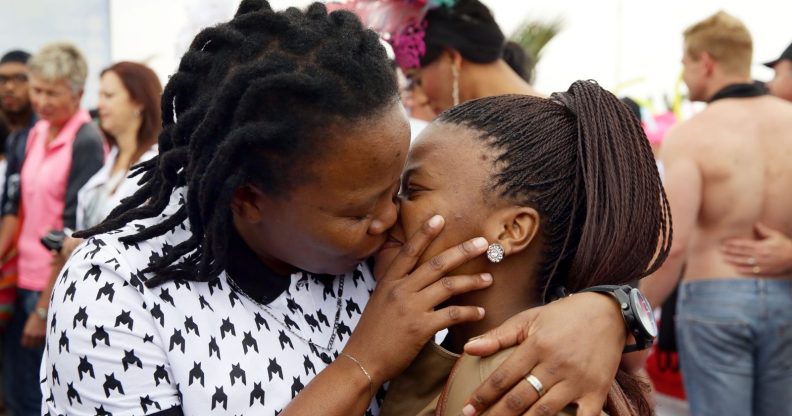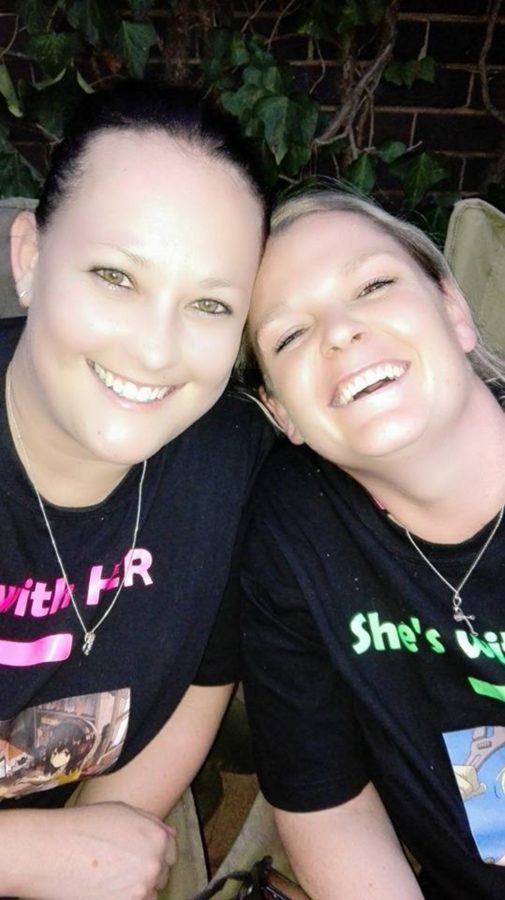What is happening to LGBT+ rights in South Africa?

Lesbians kissing in South Africa, where same-sex marriage is legal (Photo by RAJESH JANTILAL/AFP/Getty Images)
A surge in LGBT-targeted violence, including corrective rapes, and the murder of a lesbian couple who were raped, tortured, murdered and then set alight has caused an uproar across the nation.
While one couple were ‘abused and told to stay naked by police’ in a horrific viral video, a South African church has been accused of beating gay men half to death and forcing them to pay for ‘damages’ after they realised his sexuality.
And one of the most horrific hate crimes of all time saw married lesbian couple Joey and Anisha van Niekerk beaten, tortured, raped and then set alight, resulting in the loss of their lives in a devastating case that has shaken the country.
Most recently, protests broke out in Johannesburg after the a film that discusses gay men within the Xhosa community ‘Inexba The Wound’ was set to be screened in a local cinema.
While South Africa may have been one of the first countries in the world to introduce LGBT rights into its constitution, the nation holds a complicated relationship with its LGBT community.
South Africa’s LGBT history
South Africa’s homophobia is a colonial export.
Sexual activity between men was prohibited until 1994, with the age of consent was set at 19 for all same-sex sexual conduct, regardless of gender.
In May 1996, South Africa became the first jurisdiction in the world to provide constitutional protection to LGBT people, via section 9(3), which disallows discrimination on race, gender, sexual orientation and other grounds.
And although the country legalised same-sex marriage in 2006, an aggressive scheme of discrimination is still in place in the country – and it affects some members of the community more than others.

(Facebook/joey van nierkerk)
Hate crimes and corrective rapes
As seen in the case of the van Nierkerks, discrimination in particular against lesbian women is still rife in some rural areas of South Africa.
In targeted hate crimes, some gay women are subjected to “corrective rape”, with black lesbians in poor townships under significant risk.
According a five-year report by the Hate Crimes Working Group, the most discriminated against group in South Africa are the LGBT community, with 35% of hate crimes reported coming from LGBT+ people.
The personal and the political
Although constitutionally LGBT+ South Africans are protected, the perception of the community on a local and national scale is in flux.
President Jacob Zuma may have legalised same-sex marriage in 2017 in the country, but has been known to make hostile comments against LGBT people.
“When I was growing up, unqingili (a gay person) would not have stood in front of me. I would knock him out,” Zuma is quoted as having said. He was speaking at Heritage Day celebrations in KwaDukuza.
Although he later apologised, South African commentator Darin Graham has remarked on the duplicity at force in South African society when it comes to acknowledging and advocating for gay people.
“Though South Africa has progressive laws for LGBT+ people – what’s on paper does speak for the reality of how things are,” said journalist and South African native Darin Graham to PinkNews.
“And what’s really sad is that because of the advanced legal frameworks, some LGBT+ Africans facing unprecedented violence in their countries come to South Africa seeking refuge only to find that in many communities in the country – homophobia is rife and support is almost non-existent.
And like Zuma’s comments indicate, there are a host of wider cultural issues at play that affect how homosexuality is seen in a multicultural country like South Africa.
“There are also problems among other groups like the Afrikaner community. A lot Afrikaans families are very traditional and young LGBT Afrikaners are often forced to hide their identities from their families. Some are disowned by their parents and in South Africa, there is hardly any support or welfare for them. It’s not like in Britain – where there are some options available out there that people can fall back in really bad times. In South Africa, there is nothing and the sad reality is that a lot of these people end up on the streets, turn to drugs or sex work because they have no other choice.”
“I think in some areas it is getting worse, and in others it is improving. In places like the Eastern Cape, the home of the amaXhosa, the need for services to help LGBT people and their protection is imminent. LGBT people living there are three times more likely to be attacked then anywhere else in the country,” said Graham.
The future for South Africa
The likes of the Hate Crimes Working Group are vying to establish hate crime legislation in order to establish protections and justice for LGBT people.
“Twenty-four years into democracy, we still don’t have a government that responds to this need,” said lead researcher Joan Nel to www.mambaonline.com.
“Why is it that in 2018… it is up to civil society with its limited resources to do this sort of research?” asked said compiler of the report, Yolanda Mitchell, to the South African publication.
“We need a hate crime law to understand the problem in a country like ours, where we are sitting with massive inequality and massive divisions.”
For Darin Graham, a wider cultural push with the production of films like Inexba The Wound will start the conversations that will join together South Africans from all walks of life.
“There are a lot of organisations working very hard in South Africa to fight against a lot of these problems and I think actually, Inxeba in a way, has sparked up conversation and debate in South Africa and actually a lot of people from within these communities have come out and stood up for LGBT+ people and I think that is a very positive thing.”
I hope when the new president and administration comes into power, services and support for LGBT people in South Africa improves, because President Zuma has done little for them,” he added.

